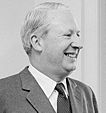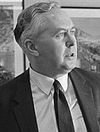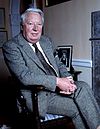- United Kingdom general election, October 1974
-
United Kingdom general election, October 1974 
February 1974 ←
members10 October 1974
Members elected→ 1979
membersAll 635 seats in the House of Commons
318 seats needed for a majorityFirst party Second party Third party 
Leader Harold Wilson Edward Heath Jeremy Thorpe Party Labour Conservative Liberal Leader since 14 February 1963 28 July 1965 18 January 1967 Leader's seat Huyton Bexley North Devon Last election 301 seats, 37.2% 297 seats, 37.9% 14 seats, 19.3% Seats won 319 277 13 Seat change  18
18 20
20 1
1Popular vote 11,457,079 10,462,565 5,346,704 Percentage 39.2% 35.8% 18.3% Swing  2%
2% 2.1%
2.1% 1%
1%

Colours denote the winning party, as shown in the main table of results.
(Map excludes Northern Ireland)
PM before election
Subsequent PM
1970 election • MPs February 1974 election • MPs October 1974 election • MPs 1979 election • MPs 1983 election • MPs The United Kingdom general election of October 1974 took place on 10 October 1974 to elect 635 members to the British House of Commons. It was the second general election of that year and resulted in the Labour Party led by Harold Wilson, winning by a tiny majority of 3 seats.
The election of February that year had produced an unexpected hung parliament. Coalition talks between the Conservatives and the Liberals failed, allowing Labour leader Harold Wilson to form a minority government. The October campaign was not as vigorous or exciting as the one in February. Despite continuing high inflation, Labour was able to boast that it had ended the miner's strike which had dogged Heath's premiership and had returned some stability. The Conservative Party, still led by Edward Heath released a manifesto promoting national unity, however their chances of forming government were hindered by the Ulster Unionist Party refusing to take their whip at Westminster in response to the Sunningdale Agreement of 1973.
The election saw the Labour Party return 319 MPs, giving them the ability to form a majority government, albeit with a mere 3 seats. The Conservatives and the Liberals each saw their vote share fall, and Conservative leader Edward Heath was ousted as party leader in February 1975 and replaced with future Prime Minister Margaret Thatcher. The Scottish National Party achieved their best ever Westminster representation at this election, winning 11 of Scotland's 71 seats and 30% of the Scottish popular vote. Labour's parliamentary majority eroded in the 1974-1979 parliament, through a series of by-election losses and defections, which led to deals with the Liberals, the Ulster Unionists, the Scottish nationalists and the Welsh nationalists having to be carried out.
This was the last general election to be won by Labour until 1997.
The election was broadcast live on the BBC, and was presented by David Butler, Alastair Burnet, Robert McKenzie and Robin Day.[1][2]
Contents
Campaign
The brief period between the elections gave Wilson the opportunity to demonstrate reasonable progress. Despite high inflation, the miners' strike that had dogged Heath was over and some stability had been restored. Following the February election Heath had remained largely out of the public eye. As was expected, the campaign was not as exciting or as close as the one in February, and overall coverage by broadcasters was significantly scaled back. The Conservatives campaigned on a manifesto of national unity, in response to the mood of the public. Labour campaigned on its recent successes in government, and although the party was divided over Europe, their strengths outweighed that of Heath, who knew his future relied on an election victory. As for the Liberals and the SNP Devolution was a key issue, and was now also one the two main parties also felt the need to address. As for the Liberal manifesto, they simply reissued the one they had created for the last election. [3]
Timeline
The Prime Minister Harold Wilson made a ministerial broadcast on television on 18 September to announce that the election would be held on 10 October, less than eight months since the previous election. The key dates were as follows:
Friday 20 September Dissolution of the 46th parliament and campaigning officially begins Monday 30 September Last day to file nomination papers Wednesday 9 October Campaigning officially ends Thursday 10 October Polling day Friday 11 October The Labour Party wins control with a majority of 3 Tuesday 22 October 47th parliament assembles Tuesday 29 October State Opening of Parliament Results
Labour achieved a swing of 2% against the Conservatives. This would be the first time since 1922 that a government had won an overall majority with less than 40% of the vote, albeit with only a small majority of 3. The Conservatives won just 36% of the vote, their worst share since 1945, and as for the Liberals a slight drop in the vote saw them make a net loss of 1 seat.
UK general election October 1974 Candidates Votes Party Standing Elected Gained Unseated Net % of total % No. Net % Labour 623 319 20 2 + 18 50.236 39.2 11,457,079 + 2.0 Conservative 622 277 2 22 - 20 43.622 35.8 10,462,565 - 2.1 Liberal 619 13 1 2 - 1 2.047 18.3 5,346,704 - 1.0 SNP 71 11 4 0 + 4 1.732 2.9 839,617 + 0.9 Ulster Unionist 7 6 0 1 - 1 0.944 0.9 256,065 + 0.1 Plaid Cymru 36 3 1 0 + 1 0.472 0.6 166,321 + 0.1 SDLP 9 1 0 0 0 0.6 154,193 + 0.1 National Front 90 0 0 0 0 0.4 113,843 + 0.2 Vanguard 3 3 0 0 0 0.3 92,262 + 0.1 Democratic Unionist 2 1 0 0 0 0.3 59,451 + 0.1 Alliance 5 0 0 0 0 0.2 44,644 + 0.1 Independent Labour 7 0 0 1 -1 0.2 33,317 + 0.1 Independent Republican 1 1 1 0 + 1 0.2 32,795 + 0.2 Republican Clubs 5 0 0 0 0 0.1 21,633 + 0.1 Unionist Party NI 2 0 0 0 0 0.1 20,454 N/A Communist 29 0 0 0 0 0.1 17,426 0.0 Democratic Labour 1 0 0 1 - 1 0.1 13,714 + 0.1 Labour (NI) 3 0 0 0 0 0.0 11,539 0.0 Independent 32 0 0 0 0 0.0 8,812 - 0.1 Independent Ulster Unionist 1 0 0 0 0 0.0 4,982 N/A United Democratic 13 0 0 0 0 0.0 4,810 N/A Independent Conservative 4 0 0 0 0 0.0 4,559 0.0 More Prosperous Britain 25 0 0 0 0 0.0 4,301 0.0 Workers Revolutionary 10 0 0 0 0 0.0 3,404 0.0 Independent Liberal 3 0 0 0 0 0.0 3,277 - 0.2 Volunteer Political 1 0 0 0 0 0.0 2,690 N/A Irish Civil Rights 7 0 0 0 0 0.0 2,381 N/A People Movement 5 0 0 0 0 0.0 1,996 0.0 Marxist-Leninist (England) 8 0 0 0 0 0.0 1,320 0.0 English National 2 0 0 0 0 0.0 1,115 N/A United English National 1 0 0 0 0 0.0 793 N/A Marxist-Leninist (Ireland) 3 0 0 0 0 0.0 540 N/A Mebyon Kernow 1 0 0 0 0 0.0 384 N/A Socialist (GB) 1 0 0 0 0 0.0 118 N/A All parties shown.
Government's new majority 3 Total votes cast 29,189,104 Turnout 72.8% Votes summary
Seats summary
See also
References
- F. W. S. Craig, British Electoral Facts: 1832-1987
- United Kingdom election results - summary results 1885-1979
Manifestos
- Putting Britain First - Oct 1974 Conservative manifesto.
- Britain Will Win With Labour - Oct 1974 Labour Party manifesto.
- Why Britain Needs Liberal Government - Liberal Party manifesto.
 Elections and referendums in the United Kingdom
Elections and referendums in the United KingdomGeneral elections 1801 co-option · 1802 · 1806 · 1807 · 1812 · 1818 · 1820 · 1826 · 1830 · 1831 · 1832 · 1835 · 1837 · 1841 · 1847 · 1852 · 1857 · 1859 · 1865 · 1868 · 1874 · 1880 · 1885 · 1886 · 1892 · 1895 · 1900 · 1906 · 1910 (Jan) · 1910 (Dec) · 1918 · 1922 · 1923 · 1924 · 1929 · 1931 · 1935 · 1945 · 1950 · 1951 · 1955 · 1959 · 1964 · 1966 · 1970 · 1974 (Feb) · 1974 (Oct) · 1979 · 1983 · 1987 · 1992 · 1997 · 2001 · 2005 · 2010 · NextLocal elections European elections Referendums 1975 · 2011Elections and referendums in Great Britain • Ireland • Northern Ireland • Scotland • WalesPremierships 1964-1970 · 1974-1976General elections Party elections Constituencies Resignation Honours Family Related articles D-notice affair · Gnomes of Zürich · Harold Wilson conspiracy theories · Clockwork Orange · The Lavender List · Wilson Doctrine · BibliographyPremiership General elections Party elections Constituencies Related articles Categories:- General elections in the United Kingdom
- 1974 elections in the United Kingdom
Wikimedia Foundation. 2010.




